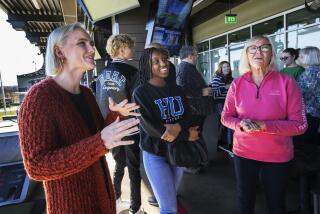Friends, Colleagues Recall Veteran FBI Agent at Memorial
- Share via
Veteran FBI agent Wendy Woskoff, who committed suicide two weeks ago, was eulogized Thursday by friends, colleagues and relatives as an intense, highly dedicated, creative agent who saved lives and had a significant impact on improving the agency’s technological capability.
“She was the ultimate ‘go-to’ person at the bureau” in Los Angeles, said Dennis English, a detective with the Los Angeles Police Department’s Robbery Homicide Division, during a memorial service at the Skirball Cultural Center.
English, who worked with Woskoff on a variety of cases, told mourners in a packed auditorium how she artfully followed a would-be bomber and then, by posing as a helpless customer in an electronics store, got the man to talk to her. The conversation enabled her to see what he purchased, information that played a role in his arrest and conviction before he could commit another crime. The 54-year-old Woskoff weighed just 90 pounds.
Assistant U.S. Atty. Lisa Feldman and FBI agent Scott Gariola talked about Woskoff’s love of the work she did as a technology specialist during the last decade of her 23-year FBI career.
Both remembered how Woskoff, a USC graduate, mastered the techniques of how to trace phone calls to their origin, with the help of phone company employees who initially were reluctant to provide information.
“Wendy would never hear the word ‘no,’ ” Gariola said. He said he often called her late at night during a crisis and that she always came up with information that helped other agents.
“Wendy left a very important legacy of her work,” Feldman said.
Woskoff developed specific forms for each of the phone companies, Feldman noted, in order to satisfy them that a law enforcement agency was entitled to get information rapidly. “She made them perfect,” Feldman added, and now law enforcement agencies around the country are using the forms Woskoff developed.
On a more personal note, Feldman said she regretted not having talked to Woskoff more in the weeks just before she killed herself. Woskoff’s untimely death, Feldman said, is a reminder that “casework will always be there but friends may not be.”
The final speaker was John Hoos, who was an FBI agent for 30 years and Woskoff’s ex-husband. They were married for more than 20 years. They met in 1980, when Hoos spoke at a class Woskoff taught at University High School in West Los Angeles. Soon after, she telephoned him and asked how she could become an agent. She said she had read an article in Cosmopolitan Magazine in 1981 that said FBI work was an up-and-coming career for women.
That story elicited laughter, as did several others Hoos told. He read at length from a memo Woskoff wrote to her FBI supervisor telling him she needed a better car for her surveillance work and that it needed to have a mirror that would hide her wrinkles and say in English, Hebrew and Yiddish, “Mirror, mirror on the wall, Wendy’s the fairest agent of them all.”
Hoos concluded his remarks by reading “What it takes to be Number 1,” the epistle of legendary Green Bay Packers coach Vince Lombardi, and telling the crowd that Woskoff personified the traits Lombardi described, even though she watched only one football game a year -- rooting for USC to beat UCLA.
“I firmly believe,” Lombardi wrote, “that any man’s finest hour -- his greatest fulfillment to all he holds dear -- is that moment when he has worked his heart out in a good cause and lies exhausted on the field of battle -- victorious.”
Hoos said that Woskoff had done that many times, and as Lombardi had said, “she had what it takes to be number 1, and to number you have to pay the price.”
More to Read
Sign up for Essential California
The most important California stories and recommendations in your inbox every morning.
You may occasionally receive promotional content from the Los Angeles Times.













